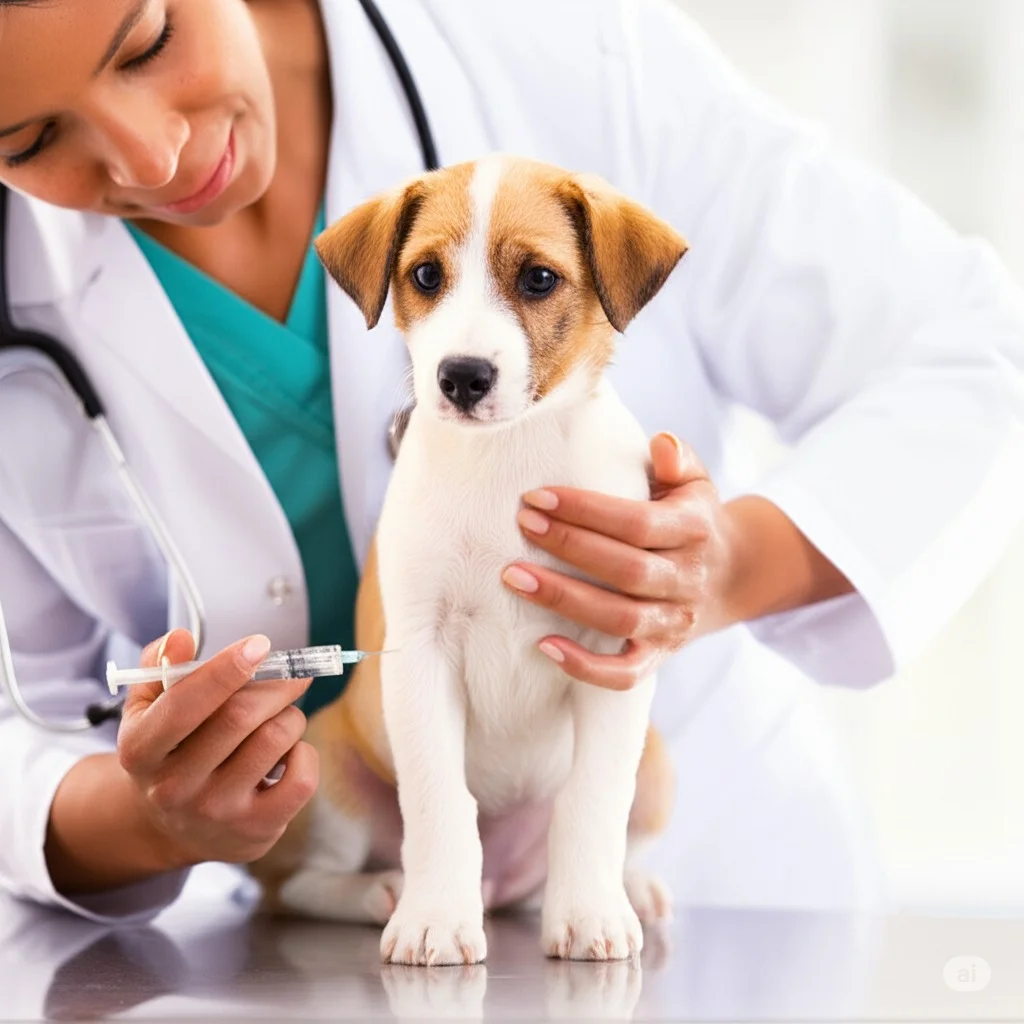5 Essential Vaccinations for Puppies: A Guide for New Pet Parents
5 Essential Vaccinations for Puppies: A Guide for New Pet Parents
Bringing a new puppy into your home is an exciting time, filled with cuddles, playtime, and endless joy. Amidst all the fun, one of the most critical responsibilities you’ll undertake as a pet parent is ensuring your furry companion receives their essential puppy vaccinations. These vital shots are the cornerstone of your puppy’s long-term health, protecting them from a myriad of highly contagious and often life-threatening diseases. Understanding the importance of puppy vaccinations and adhering to a proper schedule is paramount to giving your new family member the healthiest start possible.

Puppies are particularly vulnerable to diseases because their immune systems are still developing. While they receive some temporary protection from their mother’s milk, this immunity fades over time, leaving them susceptible to infections. Puppy vaccinations work by stimulating your puppy’s immune system to recognize and fight off specific diseases, building a robust defense against future exposure. By investing in timely puppy vaccinations, you’re not just safeguarding your own pet, but also contributing to the health and well-being of the wider canine community by reducing the spread of dangerous viruses.
Here are five essential puppy vaccinations every new pet parent should be aware of:
1. Canine Distemper Vaccine
Canine Distemper is a severe and often fatal viral disease that affects a puppy’s respiratory, gastrointestinal, and nervous systems. It is highly contagious and can be spread through airborne exposure (like sneezing and coughing) from infected animals. Young puppies under four months of age are at particularly high risk. There is no cure for distemper, making prevention through vaccination the only reliable protection.
Benefits of the Distemper Vaccine:
- Protects against a deadly, multi-systemic disease: Distemper can cause a wide range of debilitating symptoms, including fever, eye and nasal discharge, coughing, vomiting, diarrhea, and eventually neurological signs like seizures and paralysis.
- Prevents severe illness and potential death: Without proper puppy vaccinations, distemper is nearly always fatal.
- A core vaccine for all dogs: The distemper vaccine is considered “core” and is recommended for all dogs due to the universal risk of exposure and severity of the disease.
- Often part of a combination vaccine: The distemper vaccine is typically administered as part of a combination shot (like DHPP, DAPP, or DA2PP), which reduces the number of injections your puppy receives.
2. Canine Parvovirus Vaccine
Canine Parvovirus (Parvo) is another highly contagious and potentially deadly viral infection that primarily targets a puppy’s gastrointestinal tract. It is particularly aggressive and can cause severe vomiting, bloody diarrhea, loss of appetite, and lethargy. Puppies are especially vulnerable to parvo due to their immature immune systems. The virus is incredibly resilient and can survive in the environment for months, making vaccination crucial.

Benefits of the Parvovirus Vaccine:
- Guards against a highly contagious and severe gastrointestinal illness: Parvovirus can cause rapid dehydration and severe illness in puppies, often leading to fatal outcomes if untreated.
- Allows for safer socialization and exploration: Since the virus can live in dirt for years, vaccinating your puppy against parvo enables them to explore, sniff, and play without the high risk of contracting the disease.
- Reduces viral spread within the community: Vaccinating your puppy not only protects them but also helps prevent outbreaks by decreasing the spread of the virus to other dogs.
- Often included in combination puppy vaccinations: Like distemper, the parvo vaccine is commonly part of the DHPP/DAPP combination vaccine.
3. Canine Adenovirus (Hepatitis) Vaccine
Canine Adenovirus type 1 (CAV-1) causes infectious canine hepatitis, a serious disease that can affect a puppy’s liver, kidneys, and eyes. Canine Adenovirus type 2 (CAV-2) is a common cause of infectious tracheobronchitis, also known as kennel cough, which is an upper respiratory infection. The vaccine typically used is against CAV-2, which provides cross-protection against CAV-1, thereby preventing both severe liver disease and contributing to protection against kennel cough.
Benefits of the Adenovirus Vaccine:
- Protects against infectious canine hepatitis: Prevents a severe liver disease that can cause fever, vomiting, and organ damage.
- Helps prevent kennel cough (Canine Infectious Respiratory Disease Complex): CAV-2 is a significant component of the kennel cough syndrome, and vaccination helps reduce the risk and severity of this highly contagious respiratory illness.
- Reduces the risk of transmission: Vaccinated puppies are less likely to spread respiratory illnesses to other dogs in social settings like dog parks or boarding facilities.
- Usually administered as part of core puppy vaccinations: This vaccine is frequently included in the DHPP/DAPP combination shot.
4. Rabies Vaccine
Rabies is a devastating and almost always fatal viral disease that affects the central nervous system of mammals, including dogs, other animals, and humans. It is typically transmitted through the bite of an infected animal. Due to its zoonotic nature (transmissible from animals to humans) and its invariably fatal outcome once symptoms appear, the rabies vaccine is legally required in most states and regions.
Benefits of the Rabies Vaccine:
- Provides protection against a universally fatal disease: Rabies is nearly always deadly once symptoms manifest, but it is entirely preventable through vaccination.
- Safeguards human health: Vaccinating your dog against rabies is a crucial public health measure, protecting your family and community from potential exposure to this deadly virus.
- Ensures legal compliance: Keeping your puppy’s rabies vaccinations up-to-date is a legal requirement in many areas, helping you avoid fines and legal issues.
- Highly effective in preventing transmission: Modern rabies vaccines are extremely effective, significantly reducing the likelihood of your dog contracting rabies.
5. Leptospirosis Vaccine
Leptospirosis is a bacterial infection caused by Leptospira bacteria, which can affect both animals and humans (zoonotic). It is transmitted through contact with the urine of infected wildlife (such as raccoons, rats, and opossums), often found in contaminated water sources, puddles, or soil. The infection can lead to severe health problems, including kidney and liver failure, and can be life-threatening. While historically considered a non-core vaccine, its status is evolving, with some major veterinary organizations now considering it a core vaccine due to increasing prevalence and zoonotic risk.
Benefits of the Leptospirosis Vaccine:
- Prevents a serious and potentially fatal bacterial infection: Leptospirosis can cause severe illness, including kidney and liver damage.
- Protects both your dog and your family: As a zoonotic disease, leptospirosis can be transmitted from infected dogs to humans, making the vaccine important for public health.
- Crucial for dogs with outdoor exposure: Dogs who spend time outdoors, especially near water, woods, or areas with wildlife, are at higher risk and benefit greatly from this puppy vaccination.
- Reduces environmental contamination: Vaccinated dogs are less likely to shed the bacteria, helping to control the spread in the environment.
Frequently Asked Questions About Puppy Vaccinations
Q1: When should my puppy receive their first vaccinations?
A1: Puppy vaccinations typically begin when your puppy is between 6 to 8 weeks old. They will then receive a series of booster shots every 2-4 weeks until they are around 16 weeks of age to ensure full protection. The exact schedule for puppy vaccinations will depend on the specific vaccines used and your veterinarian’s recommendations.
Q2: How much do puppy vaccinations cost?
A2: The cost of puppy vaccinations can vary depending on your geographic location and veterinary clinic. Generally, the initial series of core puppy vaccinations might range from $180 to $250 for all doses. Individual vaccine doses can range from $15 to $75. While there’s a cost involved, it’s significantly less than treating a preventable disease.
Q3: What are the common side effects of puppy vaccinations?
A3: Most puppies experience mild and temporary side effects, which usually last for a day or two. These can include tenderness or mild pain at the injection site, slight lethargy or fatigue, a low-grade fever, and a temporary decrease in appetite. In rare cases, more serious allergic reactions like facial swelling, hives, vomiting, or difficulty breathing can occur, requiring immediate veterinary attention. While these severe reactions are uncommon, the benefits of protecting your puppy from serious diseases far outweigh the risks.
Conclusion
Ensuring your puppy receives their essential puppy vaccinations is one of the most proactive and loving steps you can take for their health. These preventative measures create a strong immune foundation, protecting your cherished companion from highly contagious and potentially fatal diseases. While the initial series of puppy vaccinations requires multiple visits to the vet, this investment in time and resources pays dividends in a lifetime of health and happiness. Always consult with your veterinarian to establish the most appropriate and personalized puppy vaccination schedule for your specific pet, taking into account their lifestyle and local disease prevalence. Prioritize these crucial puppy vaccinations to give your furry family member the best possible start in life.
